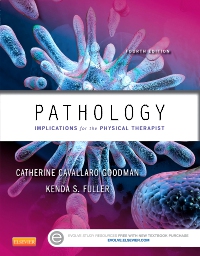
Pathology - Elsevier eBook on VitalSource, 4th Edition
Elsevier eBook on VitalSource

-
- Incorporates the Medical Model, the Disablement Model, and the ICF Model
- Incorporates Preferred Practice Patterns from the Guide to Physical Therapist Practice, Second Edition throughout the text
- Presents key information in at-a-glance format that is organized by body system for easy reference
- Provides the basic science information and the clinical implications of disease within the rehabilitation process, covering common illnesses and diseases, adverse effects of drugs, organ transplantation, laboratory values, and much more
- Focuses on health promotion and disease prevention throughout
- “Special Implications for the Therapist” sections present the most likely practice patterns associated with each disease or disorder and address precautions, contraindications, and considerations specific to PTs.
- Current information on conditions, medical testing and treatment, and practice models keeps you up-to-date on the latest research findings and recent changes in the field.
- Companion Evolve site provides easy access to articles referenced in the text with links to Medline.
- Tables and text boxes throughout the text summarize important information and highlight key points.
-
- Full color interior design, photos, and illustrations
- Chapter on Behavioral, Social, and Environmental Factors Contributing to Disease and Dysfunction includes clinical models of health, variations in client populations, and lifestyle factors that are important to consider when treating a patient.
- “A Therapist’s Thoughts” offers personal and clinical insights from experienced therapists specializing in cystic fibrosis, lymphedema, and psychological problems.
- Now covers the World Health Organization’s International Classification of Functioning, Disability, and Health (ICF), a model that includes the level of participation in desired activities as a criterion for establishing status and goals
- UPDATED! Evidence-based content with over 6,000 references
- EXPANDED chapter on the lymphatic system features additional sections on lymphatic diseases plus exercise guidelines, education, and a home program for patients with a compromised lymphatic system.
- UPDATED chapter on lab values features new information on potassium levels and exercise, albumin levels related to nutrition and wound healing, and coagulation studies in relation to exercise.
- EXPANDED chapter on Psychosocial–Spiritual Impact on Health Care offers new information on fear avoidance behaviors, substance abuse, malingering, personality disorders, abuse, eating disorders, and the impact of nonphysical trauma to health and disease as well as combat trauma, torture, and the effects of war.
- Appendix B: Guidelines for Activity and Exercise includes updated information on aquatic physical therapy from leaders in the field, emphasizing precautions and contraindications for this modality.
-
SECTION I: INTRODUCTION
1. Introduction to Concepts of Pathology
2. Behavioral, Social, and Environmental Factors Contributing to Disease and Dysfunction
3. The Psychosocial-Spiritual Impact on Health Care
4. Environmental and Occupational Medicine
5. Problems Affecting Multiple Systems
6. Injury, Inflammation and Healing
SECTION II: CLINICAL MEDICINE
7. The Immune System
8. Infectious disease
9. Oncology
10. The Integumentary System
11. The Endocrine and Metabolic Systems
12. The Cardiovascular System
13. The Lymphatic System
14. The Hematologic System
15. The Respiratory System
16. The Gastrointestinal System
17. The Hepatic, Pancreatic, and Biliary Systems
18. The Renal and Urologic Systems
19. The Male Genital/Reproductive System
20. The Female Genital/Reproductive System
21. Transplantation
SECTION III: PATHOLOGY OF THE MUSCULOSKELETAL SYSTEM
22. Introduction to Pathology of the Musculoskeletal System
23. Genetic and Developmental Disorders
24. Metabolic Disorders
25. Infectious Diseases of the Musculoskeletal System
26. Musculoskeletal Neoplasms
27. Soft Tissue, Joint and Bone Disorders
SECTION IV: PATHOLOGY OF THE NERVOUS SYSTEM
28. Introduction to Central Nervous System Disorders
29. Infectious Disorders of the Central Nervous System
30. Central Nervous System Neoplasms
31. Degenerative Diseases of the Central Nervous System
32. Stroke
33. Traumatic Brain Injury
34. Traumatic Spinal Cord Injury
35. Cerebral Palsy
36. Epilepsy
37. Headache
38. Vestibular Disorders
39. The Peripheral Nervous System
40. Laboratory Tests and Values
Appendix A: Summary of Standard Precautions
Appendix B: Guidelines for Activity and Exercise

 as described in our
as described in our 